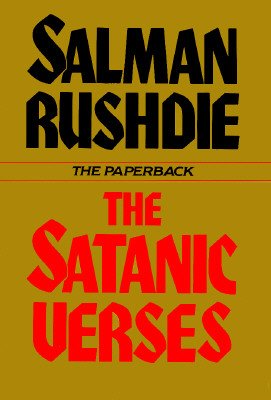Back in the early nineties, I went to school in Munich. The media was buzzing about the Fatwa calling for Salman Rushdie’s and his publishers' assassination by Ayatollah Khomeini, the Supreme Leader of Iran. The book was banned in several countries but I rushed to buy myself a copy as soon as it became available in Germany. It never occurred to me that it might be controversial in Lebanon. And so I, innocently, wrapped it in gift paper in my luggage for it to arrive at destination in pristine condition and headed confidently to my home country. In those days, the old Beirut Airport was still under the supervision and control of the Syrian Forces and the Hafez Assad portraits used to be seen everywhere. I have no idea why the security guys decided to think that I was flying in from the USA and to go thoroughly through my overweight luggages. I was interrogated for hours on end, while my dad waited for me, anxiously, outside. For some reason, on that specific night, his contact guy was not available to whisk me out of the airport with no hassle. I ended up throwing away all my underwear since the both the Lebanese and the Syrian General Security guys were rummaging too closely through them. It wasn't until I finally got home and my mom, who was helping me unpack, asked me how I was able to get that book through, that I realized that I was fortunate none thought of unwrapping that book...
I never finished reading this book during that summer vacation. I would read a few pages and then stop. It took me years to go back to it and skim through it. Not because it was a complicated read. I guess as a teenager I had other interests and just wanted to enjoy my holidays with family and friends. The book is over 500 pages long. The narrative starts with a plane being bombed. Two actors are on board, Gibreel Farishta and Saladin Chamcha, both of Indian Muslim background. They are miraculously saved, the former impersonating the Archangel Gabriel and the latter the Devil. The author repeatedly stated that the plot was a satiric writing more concerned with immigration than religious critique. Yet several Muslim communities around the world found several elements of the book offensive, like naming a Bollywood star Gabriel, or the reference to a group of Quran verses, allegedly invoking 3 pagan Meccan goddesses, and that the Prophet would deem deceptive and not to be a revelation from God. This read can be arduous, the narrator jumping back and forth between the magical and dream realms and reality. It addresses immigration and cultural issues of the late 1980's in the UK. It is certainly entertaining to read about the struggles between the Angel and the Devil, what is credible and what is not, and at some point you would ask yourself: if dreams are not real, and reality isn't either, what is?

